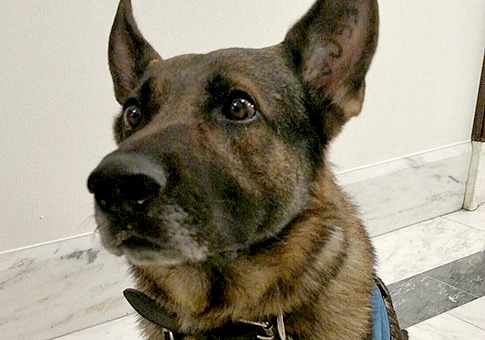When President Obama signed the 2016 National Defense Authorization Act on the day before Thanksgiving, after originally threatening to veto it, he approved $607 billion in military spending and small yet meaningful changes to how the military handles its retired working dogs, guaranteeing them a return ticket to the United States at the end of their service.
Until now the military’s policies had resulted in dogs being retired in overseas kennels and sometimes being separated from their handlers in the adoption process. Under the language in the new law, introduced by Rep. Frank LoBiondo (R., N.J.) and Sen. Claire McCaskill (D., Mo.), all military working dogs will be guaranteed a ride home on military aircraft and their handlers will be allowed to adopt them before anyone else.
The American Humane Association pushed for over a year to see the changes put into law. Prior to the passage of the law, the association spent up to $6,000 per case to bring retired military dogs home and reunite them with their handlers. Last year the charity brought 21 dogs back from overseas.
"I was told by our political advisors, who are knee deep in this everyday, ‘Robin this isn’t going to happen we just want to set your expectations’ and I said ‘it’s gonna happen, we gotta make it happen," said Dr. Robin Ganzert, president and CEO of the association. "To be told by the old timers on the Hill that there’s no way in heck this is going to happen and to do it? Oh my gosh, I can’t tell you."
"It really felt so great."
The Humane Association believes that reuniting a handler and the dog they were teamed with can help them with both physical and emotional wounds that can come from serving in a war zone.
As President Obama signed the act on Wednesday, the non-profit was working to bring another dog, named Freddy, back home.
"We were certainly overjoyed," Ganzert said. "We were working with one more dog who was getting ready to retire overseas and we were getting ready to pay for the flight and make all the arrangements. And now we hope that this dog will be one of the first ones to fly back home for his retirement with his former Army handler."
Ganzert estimated there were around 2,500 dogs currently serving the military overseas.
"And it’s not just those 2,500 precious canines it’s also their handlers at the other end of the leash," she said. "When they come back suffering from those invisible wounds of war, we’re hoping that their four legged battle buddy will help them heal from PTS. We know it works. We’ve seen it work."
Ganzert said she spoke with some of the veterans who had lobbied Congress alongside their dogs throughout the year. "Thanksgiving Day was a great day of rejoicing with the handlers," she said.
One of those handlers is Sgt. Brent Grommet, who was separated from his dog, Matty, after they were both wounded by an IED in Afghanistan.
Grommet, who credits being reunited with Matty last Thanksgiving with saving his life, was elated at news of it being signed.
"To have him, a year later, be able to be part of this legislative victory just gave him such a sense of purpose, to be able to pay it forward to future handlers," Ganzert said. "These gentlemen that we’ve had the pleasure of working with as advocates for them on the Hill, it’s a new mission for them. And that mission is to pay it forward to future handlers so they don’t have to go through the bureaucracy and the pain of being separated from a battle buddy."
"So this has been a beautiful mission these guys have been on and to bring it to them on Thanksgiving was a day, really, of thanks just to be so utterly corny about it," Ganzert said with a chuckle. "It’s about as corny as a Hallmark movie to have this happen on Thanksgiving-eve. What a blessing."
Now that the military dogs are guaranteed a ride home and their handlers are put at the front of the adoption list, Ganzert aims to make the job of caring for them easier. Since 2014, New Jersey’s Red Bank Veterinary Hospital has offered free specialty care for all veteran canines, but Ganzert is pushing for more.
"We also did a call to action to the private sector and said, okay guys, time to step up and provide for veterinary care," she said. "We achieved free specialty veterinary care but I’m still calling for free primary care. These handlers that are former-military, a lot of them, to have a battle buddy in their home is a grand expense."
The association is also working on a program to send care packages to currently deployed military dogs filled with canine care essentials, as well as some treats.
